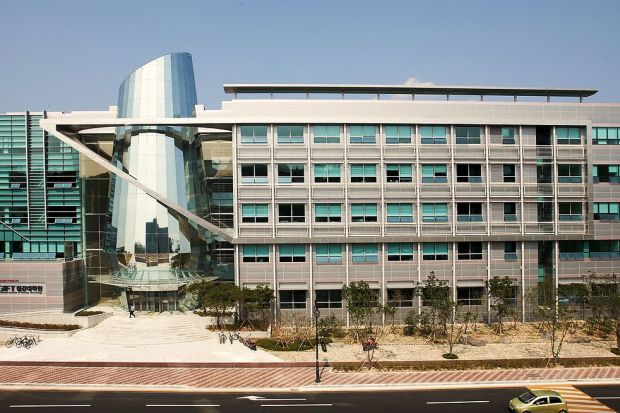POSTECH: Leading the World in Energy Materials Beyond Steel
POSTECH’s Graduate Institute of Ferrous Technology (GIFT), the world’s only graduate institute that trains experts in ferrous technology, has recently changed its name to Graduate Institute of Ferrous & Energy Materials Technology (acronym unchanged) to embark on a new journey. The expansion is to move away from education focused on steel and to cultivate experts in convergence technologies including energy materials, regarded as a key technology of the future.
In 1994, POSTECH founded the Graduate School of Iron and Steel Technology (GSIST) focusing on master’s programs to implement commissioned and retraining programs for employees from steel companies. Meanwhile, Korea welcomed an era of cutting-edge industries such as electronics and displays beyond just materials. POSCO, faced with a brain drain, set up a strategy to become the world’s number one steel company. That very strategy was embodied in the Graduate School of Ferrous Technology (GIFT) which opened in 2005 to attract talented individuals for R&D.
GIFT established research labs in ten areas most essential to the steel industry at the time to lay down the foundation for nurturing professionals. GIFT astonished the world by bringing in scholars to Pohang from countries with advanced steel competencies like the United Kingdom, Belgium, Japan and France.
“Since its establishment, GIFT has provided world-class education and research on ferrous technology and structural metal materials in close cooperation with POSCO,” explained Sung-Joon Kim, the dean of GIFT. He added, “As energy becomes more important, such as the recent rise in environmental issues, GIFT has decided to prepare for that future in tune with the change.”
Energy technology is vital to humanity and a key sector of future technologies. Therefore, POSTECH plans to prepare by expanding the scope of education to energy technology beyond steel. Since POSTECH and POSCO have worked together for a long period time, POSTECH will contribute its strength by cultivating professionals in line with POSCO’s pursuit of rechargeable batteries.
On the reason why he introduced an education system on secondary batteries at GIFT, Professor Kim explained, “GIFT has achieved world-class success in developing new steel alloys and production processes for the past 15 years.” He added, “Based on the well-established industry-academia cooperation model, it was judged to be suitable for nurturing professionals in secondary battery industry.
Armed with this mission, four students have started at the new GIFT this month. In addition to faculty who are already studying secondary batteries at POSTECH, five additional full-time faculty members will be recruited in the energy materials field (anode and cathode materials, and next-generation batteries, etc.). The enrollment quota will also be increased to 15 (10 master’s and 5 doctoral) students.
“As we did in the early days of establishing GIFT, we are working hard to recruit the most qualified experts at home and abroad as we expand into the energy materials sector,” explained Professor Kim. “More students will be recruited in the second half of the year allowing a full roll-out of the program in the fall.”
Recently, the city of Pohang selected rechargeable batteries, biomedical, and artificial intelligence sectors as key future industries. In light of this, GIFT plans to strengthen its cooperation with regional governments. Starting this year, GIFT has conducted projects with steel SMEs in the Gyeongsangbuk-do region and will be expanding its scope to secondary batteries. In addition, GIFT will foster student start-ups considering the fairly short lead-up time from R&D to commercialization in the energy materials sector.
“Korea’s regional cities are facing depopulation crisis,” remarked Professor Kim. “As GIFT is located in Pohang, we want to play a role in bringing people to the region and revitalizing it.”
In closing, Professor Kim expressed that the strategy for the new GIFT is ‘first mover’. GIFT aims to contribute to the national industries by cultivating professionals in convergence studies dealing with energy, steel, and AI. “This is just a start,” he remarked. “We will lay down strong groundwork to become an industry leader in advanced materials.”

